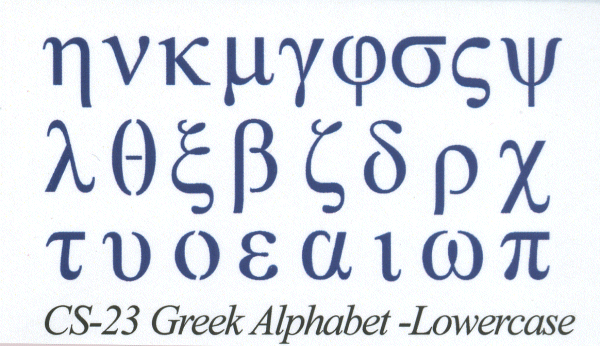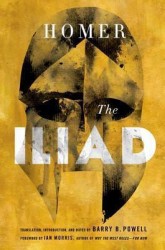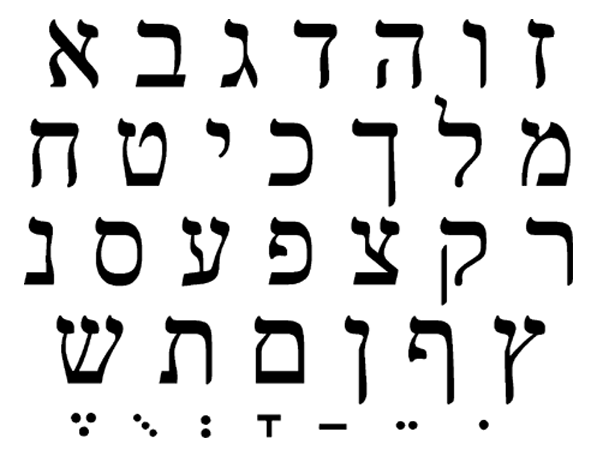Poetry Commentary: Thoughts on Reading a New Translation of The Iliad
Powell, the translator, a respected classicist, is noted for promulgating the theory that the Greek alphabet was designed precisely in order to capture epic poetry, provide some approximation of its sounds.
By Harvey Blume
Reading a new translation of The Iliad – Barry B. Powell’s (Oxford University Press, 624 pages, $29.95) – I’m not going to compare it to previous translations, not daring to presume. But it is really something to be reading that poem again.
The gods are puppet masters – that’s obvious right off – but in violent disagreement about what we, their puppets, should do on the stage they set.
It thrills these deities no end to send us into shattering combat.
And it is nothing less than shattering, as in this passage, one of many in which Homer spares no details of the gore of combat:
Idomeneus stabbed Erymas in the mouth with his pitiless
bronze. The bronze spear went straight through
and came out beneath his brain, splitting the white bones.
Erymas’ teeth came flying and both his eyes
filled with blood. He gaped, spewing blood through his mouth
and nostrils, and the black cloud of death came down over him.
—Book 16, 350
Oddly, though the black cloud of death descends on many whose “black blood,” as Homer puts it, spills out and whose limbs are “loosed,” the heroes never cry out in pain. They know fear and often melt back into their armies to hide from a raging foe or to nurse their wounds. They know shame, defeat being the most ultimate shame except, perhaps, for flight. They do cry for various reasons – even but not only great Achilles – but not because they are being hurt. Homer is loquacious when it comes to bodily damage but silent when it comes to pain.
***
Do the gods envy us our mortal stakes, which they can experience only vicariously? No question but that human violence excites them to the point where they can’t resist waling on each other. (In Book 21, for example, Ares is hit by a stone – “black, jagged, and huge,” a boulder, in short – hurled by him at Athena – she’s for the Greeks, he the Trojans – which causes him to “fall down over two acres.” To miss the humor in this is to tune out an essential ingredient of Homer, the comic element, as Simone Weil, in her powerful and super-serious essay – “The Iliad; or, The poem of force” – manages to do.
***
Powell, the translator, a respected classicist, is noted for promulgating the theory that the Greek alphabet was designed precisely in order to capture epic poetry, provide some approximation of its sounds.
The Greek alphabet, he argues, shaped itself around the Homeric poems, as chanted and sung by the Greek singers of the age (circa 800 BCE).
Other writing systems came about – such is the consensus – to record transactions, accounts receivable, and the like. Text of some sort was brought about by business.
The Greek alphabet, though, as Powell has it, came equipped with vowels – absent from contemporaneous alphabets, such as Hebrew – in order to accommodate Homer and others of his ilk.
What a lovely and romantic idea.
No real proof of course, none ever to be had, and much disagreement among the specialists.
It would have been nice if Powell, so keen about the evolution of Greek text, had stopped in on, paid the least attention to, what was happening with those roughly contemporaneous Hebrew texts.
The Hebrew texts I allude to don’t highlight an Achilles; they do a David.
They don’t feature Zeus, deity supreme, master of thunder and lightning, who hurls bolts from the heights of Olympus. Instead we have Yahweh, even freakier at times, dealing from the heights of Mt. Sinai.
I don’t know how one cannot at least but compare and contrast these different uses and expressions of that hottest new thing ever – the alphabet.
I don’t know how one can write well about one articulation of that medium without troubling to allude to the other.
• To return to my rereading of the Iliad, as occasioned by the remarks Powell makes in the introduction to his new translation.
Powell writes:
The invention of the Greek alphabet c. 800 BC was the third most important invention in the long history of the human species after the discovery of fire in the primordial past, and the invention of writing itself c. 3400 in Mesopotamia. The Greek alphabet . . . allows the re-creation of rough phonic equivalent of speech, even if you do not know the language. The Greek alphabet was the first system of writing capable of preserving Homer, and it seems to have been designed for this very purpose.
Let us slow this down and parse it.
“The Greek alphabet c. 800 BC was the third most important invention in the long history of the human species.”
More important than the Hebrew alphabet being employed southeast of Greece, in another, not all that distant redoubt of the Mediterranean, and from which there flowed texts no less essential to the culture of the world as we know it than Homeric Greek? Really more important than that? So much more important that the Hebrew alphabet need not even be mentioned in the same breath as Powell’s extravagant claim for Greek?
Let me then mention what he does not.
Biblical Hebrew, generating literature roughly contemporaneous with Homeric epics, was, it is true, absent vowels – the vowels and vowel markings of Hebrew being introduced much later. It could not, then, as accurately as Homeric Greek, reproduce the actual sounds of speech.
One result, for example, a rather resonant one for the religion that grew out of Biblical texts, is that Jews do not know how to pronounce the true name of God — the tetragrammaton, the four letter name, Yod He Waw He, to name the Hebrew letters, or in English, YHVH.
Could it be that Hebrew was absent vowels precisely to keep that pronunciation secret? Only the high priest on the highest of holidays was empowered to utter this NAME with impunity and authority.
I like that.
I believe in it exactly as much and as little as I believe in the idea that the Greek alphabet was shaped and molded by the need to reproduce the sound of Homeric epics.
Were both Homeric Greek and Biblical Hebrew configured by the deepest religious/poetic impulses of Greek and Hebrew culture?
Such a sweet idea…
But here’s something else.
Homeric Greek, indeed, employed a full alphabet. The Hebrews, however, with their comparatively reduced set of letters, their consonants, did something distinctive with what alphabet they had. Their key writings point to the alphabet itself so as to esteem it above all other modes of expression. The Hebrews were, in effect, the better McLuhanites: Not only did they use the hot new medium of their day and age but they bragged on it, privileged it.
Think Second Commandment: No graven images.
Think, too, what happens when Moses comes down from Sinai and finds his people reverting to old media – as in dancing etc. around a golden calf. He smashes the Tablets of the Law upon that resurgent idol. He goes up for another session with YHVH and returns with a definitive edition of the Commandments.
It’s not only the Second Commandment as written but the whole event, the entire revelation at Sinai – a fulcrum of the Hebrew Bible – that aims at zero tolerance for dancing, sculpture, graven images.
That allows only for text, the text of the Tablets of the Law. Alphabetic text.
The Greeks, remember, for all their marvelous uses of the alphabet, had other media, graven images galore.
For the Hebrews, there was only one means of expression to be trusted with what counted.
Harvey Blume is an author—Ota Benga: The Pygmy At The Zoo—who has published essays, reviews, and interviews widely, in the New York Times, Boston Globe, Agni, The American Prospect, and The Forward, among other venues. His blog in progress, which will archive that material and be a platform for new, is here. He contributes regularly to The Arts Fuse and wants to help it continue to grow into a critical voice to be reckoned with.
Tagged: Barry B. Powell, Iliad, Oxford University Press, Short Fuse





What you wrote — that was pretty good. I’m so very glad that I learned the Greek alphabet in high school. That made it easier to learn the Hebrew alphabet as an adult, and now I have the Arabic letters too. I am wonderfully endowed. I could spend the whole day debating with myself, or with others, on the merits of these written symbols.
Fascinating. Does Professor Powell have any theories explaining why the Greeks have so many, and so difficult, forms of past tense? I mean, how many past tenses does one language need??